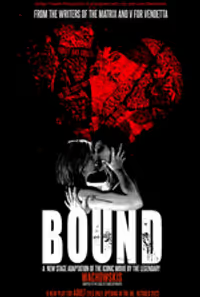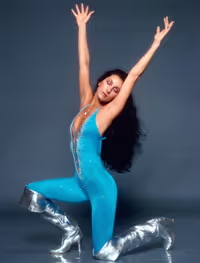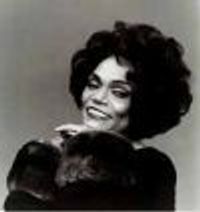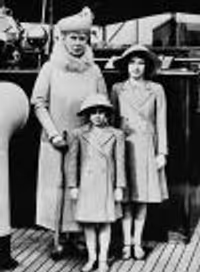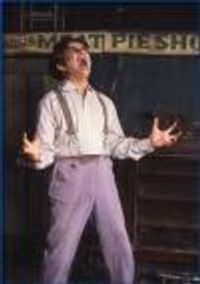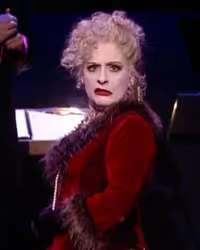Gone With The Wind reviews
#1Gone With The Wind reviews
Posted: 4/22/08 at 8:10pm
I know its a west end show but i know a lot of you guys have wanted to know about how the show was doing and its reviews.
The 1st couple of reviews have come out and it doesnt look great for the show
The Guardian, pretty much a pan except for praise for the cast
Gone With The Wind
** New London Theatre, London
Michael Billington
Wednesday April 23, 2008
The Guardian
Does no one ever learn from the past? An earlier musical of Margaret Mitchell's mammoth novel, having been seen in Tokyo and London, eventually burned out in Atlanta. Undeterred, theatrical tyro Margaret Martin has written book, music and lyrics for this new version which Trevor Nunn directs; and the result feels like a hectic, strip-cartoon account of a dated pop classic.
The problem is structural: how do you cram a 1,000-page novel into three-and-a-half hours of stage time? The answer is "with great difficulty".
Starting in 1861, the show bustles through 12 years of Scarlett O'Hara's life and American civil war history with such speed that nothing much registers. At one point, in order to spite her adored Ashley Wilkes, Scarlett marries, is widowed and gives birth to her first child in the space of 40 seconds.
The other key problem is political. Commendably the show seeks to avoid turning into a nostalgic paean, as the Selznick movie does, to old southern values. Far and away the best moment comes when Mammy, Prissy and all the black slaves who have kept plantation life going join forces to sing "all men fight for freedom from the moment of their birth".
This, you realise, is where the real drama lies. Confronted by a movement of history, the story of the wilful Scarlett, of her eventual marriage to the profiteering Rhett Butler and of her long-burning flame for the dithering Ashley seems small beer. Deep down, I suspect, the show's creator knows this. But she is shackled by the dead conventions of a novel which deploys history as a colourful backdrop to private emotion. What I crave is less a repeat of Gone With The Wind than a complete reversal of it: one that tells the whole story from the slaves' viewpoint and stresses the fact that large numbers ran away to join the Union armies.
Nunn's production makes tentative steps in this direction by, as in Nicholas Nickleby, splitting the narrative amongst various voices, including the black characters. But, like Martin, he is tethered to his source and forced to follow the tedious ups and downs of the privileged white southerners. To those who see Scarlett as a feminist role model, I can only say that heartless opportunism and emotional blindness don't strike me as the most attractive qualities; but Jill Paice does an excellent job of reconciling us to one of literature's least beguiling protagonists.
Darius Danesh also endows the morally dubious Rhett Butler with a graceful virility and residual guilt. But the most engaging performances come from Natasha Yvette Williams as the stoically enduring Mammy and from Jina Burrows as the flighty Prissy, both obliged to serve the self-regarding Scarlett.
The rest of the vast cast spend much of the evening hurtling round the balconies of John Napier's circumambient, Nickleby-style set, substituting energy for detailed exploration of character.
But there is something extravagantly pointless about the whole enterprise. Why revive a novel that, for all the liberal exertions of Martin and Nunn, obstinately views history through the wrong end of a telescope?
#2re: Gone With The Wind reviews
Posted: 4/22/08 at 8:10pm
From The Times 2/5
April 23, 2008
Gone with the Wind at New London
Benedict Nightingale
Frankly, my dears, I did give a damn but not as big a damn as I had hoped. To put it another way: fiddlededee to some but not all the things that are occurring in a piece I wasn’t always sure should exist.
Margaret Martin’s book for her musical version of Gone with the Wind is almost too faithful to Margaret Mitchell’s novel and, at 190 minutes, certainly too long. Trevor Nunn’s cast sometimes left me hankering for Clark Gable and Vivien Leigh, who breezed and dazzled their way through the film. Sadly, I often found myself wishing the musical just wasn’t a musical.
But that’s partly because Nunn has drawn on his experience with Nicholas Nickleby in 1980, giving us a production in which cast members inject pieces of narrative into the proceedings. This means that the story of Harlot Mascara — sorry, Scarlett O’Hara — doesn’t need songs in order to hold the attention. There are confusing bits (how does Rhett Butler escape that Yankee hangman?) and there are longueurs, especially in the second act. But the first half often has that brisk, energetic yet epic feel that one associates with Nunn’s work.
So Jill Paice’s Scarlett mournfully eyes Edward Baker-Duly’s Ashley Wilkes, the gentlemanly drip she adores, as he marries the virtuous Melanie Hamilton, while she is resisting that glamorous maverick, Darius Danesh’s Rhett. Meanwhile, war threatens those Southern belles and the Confederate flags that half-circle the audience. War duly arrives with the explosions, red light and mini-collapse of John Napier’s timbered set that signal the burning of Atlanta. Add plenty of hobbling soldiers and graphic description of Scarlett stepping over the dead, and the defeat of the South is adequately evoked. As for Danesh, he has the sauntering suavity that Gable brought to the role of Rhett, but not enough dash and danger. Those qualities are also lacking in Paice, who is warmer than Leigh in the film but still doesn’t have much fire burning within.
She gives us a bit of a feminist reading of Scarlett, which means you believe in her when she’s doughtily battling to save her beloved Tara, but you don’t fully do so when fury or passion are needed. And for a woman surely meant to embody the hard South that’s about to emerge as well as the genteel South that’s dying — well, she’s too nice.
Have Martin and Nunn tried to bring political correctness to Margaret Mitchell? Just a bit, notably when they’re treating black characters, and especially Jina Burrows’s Prissy, who is no ditsy airhead but a young woman who will use her freedom to become a teacher. Indeed, a gospel-style song in which the ex-slaves celebrate their liberty was received more warmly than any other, and a solo by Natasha Yvette Williams’s excellent Mammy almost equally so, even though neither was that relevant to the plot.
But then the rest of the music is rather so-so and the rhymed lyrics pretty flat. Did I really hear Scarlett’s dad boast in Irish ballad style that from Kerry to Connemara you won’t find land as fine as Tara? Or Scarlett sing that the life she used to know, the world she knew so well, “why did it have to turn into a living hell”? Compare that with the eloquent simplicity that marked every aspect of Nunn’s revival of Oklahoma!. It just doesn’t have the variety, the quirkiness or the moral power. And it doesn’t need the tunes.
#2re: Gone With The Wind reviews
Posted: 4/22/08 at 8:25pm
The Independent
By Paul Taylor
Wednesday, 23 April 2008
You don't have to wait long for the line "Frankly, my dear, I don't give a damn" in this new stage musical version of Gone With The Wind. You can read it, as you enter, emblazoned on the T-shirts and mugs at the merchandise stall. There are also aprons for sale that assert that "I'll never be hungry again".
It's an index of the huge popularity of the 1939 film adaptation of Margaret Mitchell's novel that these phrases are etched on the collective consciousness and it's also a measure of what this musical has to live up to in attempting to tell the story in a different way. Trevor Nunn's production is the most anticipated tuner of the season but the word from the previews was worrying, with rumours of excessive length. Now trimmed to a not exactly terse three hours 40 minutes, the show is neither as bad as one feared nor as good as one has a right to expect.
In opening out this saga of cross-purpose love, set against the backdrop of the American Civil War, the most prominent innovation is the treatment of the black community who are here granted what they were there denied: a dignified, independent voice. The racism of the South is fully acknowledged. One great benefit is that the score is enriched with spirituals, blues and gospel music, spine-tinglingly well-sung by such cast members as Natasha Yvette Williams's loveably sassy Mammy and Jina Burrows' Prissy.
But the drawback is that the well-intentioned liberal revisionism too often feels grafted-on apologetically. Once freed, the hapless Prissy has a sudden, unconvincing personality rethink and belts out her determination to learn to read and become a teacher. A dispute about responses to post-bellum whites is evasively resolved in a great whoosh of uplift in the anthem declaring that "if we close our hearts to hatred/And we open them to love/Hope will follow on the wings of a dove".
The rest of the score ranges from soppy, forgettable love songs to would-be witty, forgettable patter numbers to forgettable Irish airs about the Importance of the Land to... I forget. The story, perforce often rattled-through and perfunctory, has to rely heavily on spoken narration from figures stationed on the picket fence balcony that surrounds the curved wooden acting arena in John Napier's "environmental" design. I never thought that I'd pine for projections in a stage show but the far from awe-inspiring flash-bangs and set-collapses that evoke the burning of Atlanta; the distinctly under-populated spectacle of the Confederate dead; and the excitement-free rotating-wagon escape to Tara leave the hackneyed theatrical language of mimed horses and props looking in need of further support to register the requisite texture, tension and atmosphere.
The diabolically dashing Darius Danesh (of Pop Idol fame) brings a seductively insolent charm, a dark velvet voice and a genuine, fugitive pathos to the cynical blockade runner. If Jill Paice hasn't quite nailed the comic, outrageously feline wiliness of Scarlett, she boasts the bright, soaring vocal quality to convey the heroine's indomitable survivor's drive. The two performers are at their moving best when towards the end, each lost in their separate loneliness, they engage in an unconscious duet of marriage misery.
All the same, I was left wondering whether, on the whole, this quixotic enterprise takes us any deeper into the inner life of Gone With The Wind. The irony is that it's Max Steiner's superb score for the movie version, with its character motifs and achingly interwoven period tunes, that offers the true object lesson in how to use music dramatically.
#3re: Gone With The Wind reviews
Posted: 4/22/08 at 8:25pm
At one point, in order to spite her adored Ashley Wilkes, Scarlett marries, is widowed and gives birth to her first child in the space of 40 seconds.
I actually laughed when I read that.
#4re: Gone With The Wind reviews
Posted: 4/22/08 at 8:41pm
First time writer tackles one of the most expansive, exuberantly, bold and let's face it beloved American novel of the last century.
I heard this train coming. I smelled the cranberry sauce, I spotted the buzzards.
Not good signs.
#5re: Gone With The Wind reviews
Posted: 4/22/08 at 8:48pm
lol i know
I dont know why they did it again, this is gonna be 2 flops of Gone With the Wind in London
will they never learn
#6re: Gone With The Wind reviews
Posted: 4/22/08 at 8:51pmAny p9ctures of this curved, collapsing set?
#7re: Gone With The Wind reviews
Posted: 4/22/08 at 8:54pm
I was wondering how this show would be received. It seemed like an ill-conceived notion from the get go; at least from what I'd read. I know little about the actual production. Any chance you'll be able to see it and give us a first hand review songanddanceman?
BTW - Thanks for thinking of your extended theatre family across the pond! ![]()
#8re: Gone With The Wind reviews
Posted: 4/22/08 at 8:56pm
I have tickets for next week so i will post a review
I was supposed to be there last week but they canceled the performance i had tickets for grrr
No pics of the set yet i dont think, but TCM had a documentary on the other day and it showed it there, it looks impressive what they have done to the New London Theatre but the set doesn't seem to do much
#9re: Gone With The Wind reviews
Posted: 4/22/08 at 9:11pm
Excellent! I look forward to your review. ![]()
Here's the link to the website for the show if anyone is interested in checking it out.
https://www.gwtwthemusical.com/
#10re: Gone With The Wind reviews
Posted: 4/22/08 at 9:27pm
"What I crave is less a repeat of Gone with the Wind than a complete reversal of it."
Dumb statement. No one would stand for that. It's a beloved movie and novel. The Margaret Mitchell Estate would never agree to anything so stupid.
And don't bring up that 'reversal' book. It ain't the same thing as a musical version.
#11re: Gone With The Wind reviews
Posted: 4/22/08 at 10:20pm
I totally embarassed myself today. Tonight, my girls and I got drunk before seeing "The Lion King." We were walking down Shaftesbury and taking pictures. This sweet woman offered to take our photo in front of "Spamalot." Afterwards, she sparked a conversation with us. We told her we were studying abroad... Theater... I told her I saw "Gone with the Wind" and that it was DREADFUL. She immediately said, "Um... my friend's in the ensemble." and totally cut me off and brushed away.
Moral of the Story: Wow. I still would have said, it was dreadful! But how dramatic.
#12re: Gone With The Wind reviews
Posted: 4/23/08 at 12:10am
That kind of stuff happens to me way too often. I at least learned (the hard way) to not say anything negative about a show while in the theater. When I was attending Indiana U I was (as you can imagine) very bitter about not getting Sweeney in the theater department's production of "Sweeney Todd" (the role went to Heath Calvert, now of "Good Vibrations" fame). Well, being very bitter, and not too impressed by his performance, I tore him apart while talking to my girlfriend in our seats at intermission. I then noticed a very angry looking man behind me giving me the stare of death, who looked like...a middle aged version of Heath Calvert. Clearly, I had just talked about how awful Heath was right in front of his father. I still feel bad about it, and it was like, five years ago.
For the record, Calvert was probably pretty decent in the role considering his young age. But even if he had been brilliant, I still probably would have hated his performance out of jealousy!
RentBoy86
Broadway Legend Joined: 2/15/05
#13re: Gone With The Wind reviews
Posted: 4/23/08 at 12:29amsonganddance- what have they done to the theater that is so impressive?
#14re: Gone With The Wind reviews
Posted: 4/23/08 at 7:59amwell the theatre is an ugly theatre as best, its a new building (ish) and just looks like a big box, all the seats were torn out and put back in and now the set extends in to the audience which looks really impressive.They are walks ways which run right next to th front row and just behind them and an upper level of seats which practically has you on the set
#15re: Gone With The Wind reviews
Posted: 4/23/08 at 8:00am
more reviews
Daily Mail is a pan except praise for the actors
Frankly my dear, its not up to much
By QUENTIN LETTS - More by this author » Last updated at 11:20am on 23rd April 2008
Comments Comments
Pre-launch rumours suggested that this was going to be a disaster. Not so much Gone With The Wind as Gone For A Burton, went the whispers.
Well, it is not quite the catastrophic shipwreck suggested. But frankly my dears, its a close shave.
The show has been written (words and soupy music) by a Californian health worker, Margaret Martin, and is just about recognisable as the Margaret Mitchell novel which was turned into the 1939 film with Vivien Leigh and Clark Gable.
Never having been completely convinced by the film, I was prepared to be won over by Jill Paice and Darius Danesh, who here play Scarlett OHara and Rhett Butler. And I was, to an extent.
Mr Danesh has a husky bass voice and is dashing, even if, with his mutton chop whiskers and long legs, he resembles a Victorian villain from a Monty Python sketch.
Miss Paice, blessed with a tiny waist, has a wildness and independence of spirit. She certainly needs the latter to survive Sir Trevor Nunn's B-grade direction.
What a mess of exposition the first half hour is. Gangs of actors wander on and off, then back on as different characters, then back off, as the scene is set, re-set, then switches yet again as the audience is told that this is north Georgia in 1861. Americas civil war is about to occur.
The O'Hara's are of Irish descent … cue the penny whistle and some appalling Oirish from old man OHara who asks raven-haired Scarlett: 'Is it crying you are?'
Shed have been justified in replying: 'Yes. Because I cant take this script and your hamming any more!'
Things pick up when Mr Danesh arrives on stage and there is a spark of love interest and humour. But where is the danger? When Rhett and Scarlett finally kissed there was a wolf whistle from one theatregoer and giggles from others. Where is the storys raw allure?
There are so many people milling about on stage, some of them in ludicrously bad fake beards, that it is hard to concentrate on the lead actors.
You cant do a camera close-up on stage as you can in a film. After 32 minutes an unfortunate torpedo struck Mondays show. An unexplained clanking noise started from the wings and continued for five minutes while the poor cast tried to press on with proceedings. Scarlett's first fiancé arrived, did his courting, was accepted, impregnated her and then died all before the clanking abated. Oh well.
Setbacks are like buses. There's always another hurtling down the road, as Scarlett O'Hara finds to her pretty cost.
The music feels a bit off-the-peg. One of Rhett's early songs could be a reject from Fiddler On The Roof.
Apart from the routine allotment of ballads we are given a hoe-down, a black gospel number, a deathbed warble from Scarlett's friend Melanie (sweetly done by Madeleine Worrall) and a bedtime story from Rhett to his beloved child.
After such a cynically sugary moment it is obvious the little darling is doomed.
Sir Trevor has reportedly been chopping away at the script like a Chindit wielding his panga on jungle vegetation but it remains well over three and a half hours long.
Rather than trying to fillet scenes he should maybe just dump several altogether. Some feel farcically condensed.
Wet-as-a-sponge Ashley Wilkes (Edward Baker-Duly) arrives home from the front for some leave, walks in one door of his house, strolls through the scenery, and vacates by the back door.
Seems like you just got here, says his slave, wishing him goodbye. Exit, leave finished. Later, a narrator intones: And so, 1866 became 1867. Just like that!
Would that life were so easy, eh, Sir Trevor?
#16re: Gone With The Wind reviews
Posted: 4/23/08 at 8:01am
Out an Out pan from the all important Evening Standard
Frankly, this show is damned
By Nicholas de Jongh, Evening Standard 23.04.08
Connoisseurs of big, bad musicals must rush to catch Gone With The Wind in case it’s quickly blown away on gales of ridicule. Or is a small, well-placed tornado in the vicinity of the theatre too much to hope for? I found it a cruel, unusual punishment, being obliged to spend well over three hours watching Jill Paice’s attractive Scarlett O’Hara, parading in big dresses and even bigger displays of petulance. She sang her songs, or rather songlets, in a voice whose higher registers struck fearful sounds. How unfortunate for us that she should endlessly complain about her failure to convince Ashley Wilkes (impressively fraught Edward Baker-Duly) that he was the man for her, rather than Darius Danesh’s caddish smoothie, Rhett Butler.
Meanwhile the firing and destruction of Atlanta, the deaths or disabling of revolting Southern soldiers, proved occasional distraction to the main romantic event — for those of us who like a little light relief from the horrors of unrequited lust. This may sound an ungenerous response to a musical rendition of the 69-year old movie that turned the American Civil war into a seductive weepie and ravished countless millions of women in the process. This version, though, reminds us of the dangers of trying to cram a vintage film spectacular into theatrical confines, particularly with an absolute beginner as the adaptor. Most musicals are the work of several hands and minds. Here, however, book, music and lyrics are all attributed to Margaret Martin, who has spent 30 years taking preg-nancy classes for expectant parents in California, studied musical theory and now gives laborious birth to her first musical.
Martin’s liberal gloss on Gone With The Wind, supplying slaves with some attractive gospel songs and spirituals — “Blacks born to be free”— strikes hypocritical notes, though Natasha Yvette Williams’s black momma sings and acts with appealing ardour. For the musical, like the film, sympathises with Southerners who fight to keep slavery going and launch the Ku Klux Klan. Warfaring incidents serve as mere decorative backdrops,with wounded soldiers staggering ridiculously across the aisles like wounded models on a catwalk. Designer John Napier never attempts to conjure up the multiple locations of Martin’s overstuffed book. Even the firing of Atlanta and its flag looks a smouldering rather than flaming affair. Napier’s wooden, extended stockaded set, decorated with three leafless trees, exudes simple desolation.
Director Trevor Nunn’s Achilles heel is always the length of the heel in question. Having adapted the book he has left it in loquacious long-wind-edness. He unsuccessfully reprises the style of his Royal Shakespeare Company Nicholas Nickleby, making the actors serve as redundant narrators. The songs, brief, frail, tinkling things, sometimes having unusual instrumentation like a harp, often freighted by doggerel lyrics, with bland wisps and slithers of music, pass unremembered. Crucially, Paice’s skittish Scarlett musters no passion for the far from dangerous or demanding Rhett of Danesh, whose beautiful, high vocals are his best feature.
Frankly I do have to give a damn to the whole show.
#17re: Gone With The Wind reviews
Posted: 4/23/08 at 8:01am
Whats On Stage - Pretty much a pan 2/5
It's not a line I recall from the 1939 film of Gone With the Wind, but we're told something really startling about Scarlett O’Hara at the start of the second interminable act of Margaret Martin’s new musical play: “She walked every day for miles looking for yams.”
Frankly, my dears, I don’t give a yam, but there's a bizarre suggestion in Trevor Nunn’s production that Scarlett morphs into some kind of Mother Courage of the American Civil War, pulling her baby and belongings around on a gun carriage after the burning of Atlanta before breaking into a hymn to the transforming powers of flatulence: “The life I used to know has gone, gone with the wind.” No more curried eggs for her, then.
Jill Paice as Scarlett gives everything she’s got to this item, which I cannot label as the programme does not list musical numbers. These numbers, anyway, don't stand alone, but sidle out of the show with their footling orchestrations like guilty little secrets. If only they’d remained so. One exception is a rousing anthem to freedom by a chorus of black slaves left over from Nunn’s recent sub-standard Porgy and Bess.
The productions by Nunn and John Caird of Nicholas Nickleby and then Les Miserables were two of the greatest in our theatre of 20 years ago. They were rooted in the RSC company ideal and expressed stories of epic scale and panoramic detail in a passionate stage language that summarised other early 1980s experiments in narrative theatre and, in the case of Les Miserables, found a soaring, modern Verdian musical style to match.
Here, the distribution of the story among scattered third person parties around the huge plantation verandah design of John Napier seems like a solution to a problem, not the result of any urgency in communication. Once inside the unfriendly New London, the arena, you have to admit, is thrilling. As in his King Lear and The Seagull for the RSC last year, Nunn knows exactly how to exploit this space to the full, arranging the company hoe-downs and cakewalks with real flair, much flattered by the wonderful array of crinolines, gingham skirts and frock coats by costume designer Andreane Neofitou. The burning of Atlanta, lit by Neil Austin, is an orange glow in an ever-changing sky.
Jill Paice runs a gamut of emotions from A to B, as Dorothy Parker once said of Tallulah Bankhead, but she does so with endearing charm. There's a collective intake of breath at the sight of “Pop Idol” Darius Danesh as Rhett Butler; he’s about seven feet tall and blessed with an extraordinary bass baritone voice that he may find a way of using properly one day. For now, oddly stiff and smarmy at the same time, he looks like a joke entrant in a Clark Gable lookalike contest.
Nunn has bolstered his company with such reliable performers as Susan Tracy, Susan Jane Tanner, Jeff Shankley and Ray Shell, but none of them has much chance to shine in the encroaching, deadly mediocrity of the material. Edward Baker-Duly has a fair stab at Scarlett’s beloved Ashley Wilkes, but the stand-out performance, in every way, is that of the mighty-bosomed Natasha Yvette Williams as the black maid Mammy, surely a shoe-in for best supported actress of the year.
-Michael Coveney
#18re: Gone With The Wind reviews
Posted: 4/23/08 at 12:20pm
This summed it all up for me.
On the show's website, there is a four part "The Making of..." video.
The VERY FIRST thing on the screen is the composer, saying - I swear to god - "Gone With The Wind. This is a musical I know I can tell, like nobody else can."
Hubris of an enormous proportion, perhaps fitting the size of the subject, but instilling a desire in every theatre critic to knock her down a peg or six.
And it's very, very revealing when the visual intro to the website of a MUSICAL is SILENT.
#19re: Gone With The Wind reviews
Posted: 4/23/08 at 6:54pmThe CBS News with Katie Couric is about to do a piece on GWTW.
#20re: Gone With The Wind reviews
Posted: 4/24/08 at 4:35am
The reviews are shaping up to be a nightmarte.
The show sounds like a one-of-a-kind world-class disaster.
I can't help muttering "What were they thinking?"
"The war seems like a game. Our lives will never be the same????"
#21re: Gone With The Wind reviews
Posted: 4/24/08 at 5:21amIs there talk about moving this show to Broadway? Also, does anyone know whatever happened to the Tina Turner musical, "What's Love Got To Do With It?" I rememeber reading somewhere that they may bring it to the stage.
jagfkb
Broadway Legend Joined: 5/29/07
#22re: Gone With The Wind reviews
Posted: 4/24/08 at 7:09amGod! If you're gonna do Gone with the Wind, make it a big musical epic, NOT THIS!
#23re: Gone With The Wind reviews
Posted: 4/24/08 at 7:16am
"I told her I saw "Gone with the Wind" and that it was DREADFUL. She immediately said, "Um... my friend's in the ensemble." and totally cut me off and brushed away"
Interesting reaction. I was in London this past weekend and most of the people I was working with have friends in the production. Everyone is aware that the show is a turkey, including the cast, and are not that thin-skinned about it.
#24re: Gone With The Wind reviews
Posted: 4/24/08 at 8:02amThe cast could not escape the fact this show is a turkey, the UK is a buzz with how bad this show is supposed to be
Videos


